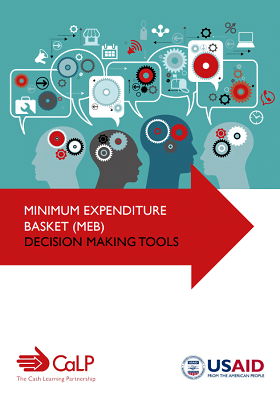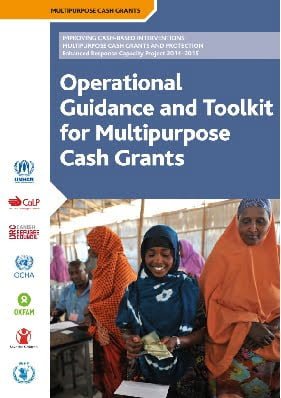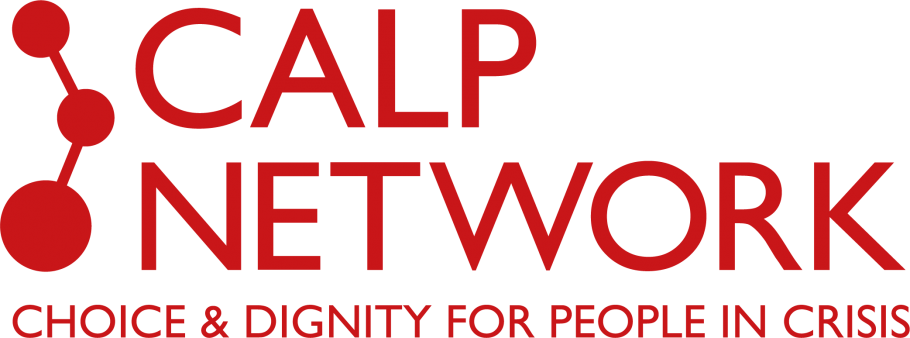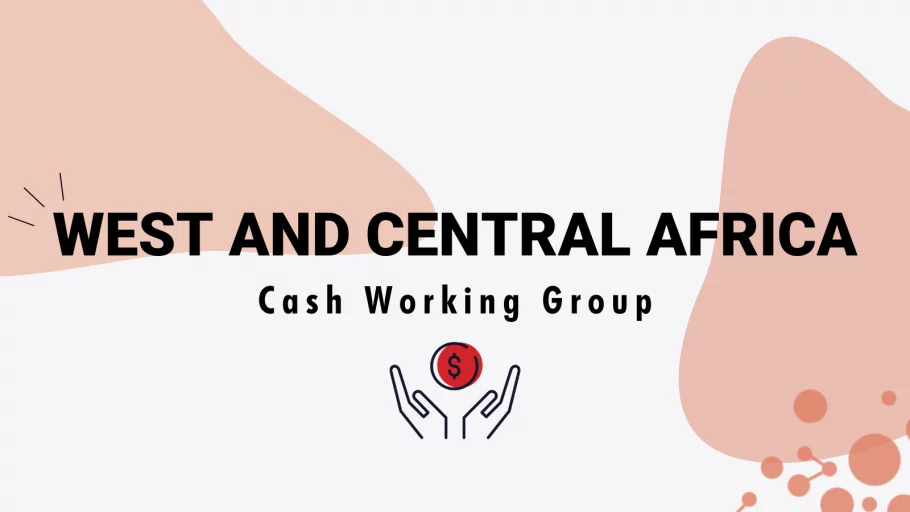المساعدات النقدية متعددة الأغراض
المساعدات النقدية متعددة الأغراض عبارة عن تحويلات نقدية غير مقيدة يمكن للأشخاص المتضررين من الأزمات استخدامها لتغطية احتياجاتهم الأساسية. بحكم طبيعتها، تعد المساعدات النقدية متعددة الأغراض طريقة المساعدة التي توفر للناس أقصى درجة من الاختيار والمرونة والكرامة. وهناك أيضًا أدلّة متزايدة على أن تلبية الاحتياجات المتعددة أكثر فعالية من حيث التكلفة وفعالية من حيث التكلفة.
لكن هذا يتطلب طرقًا جديدة للتعاون بين الجهات الفاعلة في المجال الإنساني، في جميع مراحل دورة البرنامج وبين القطاعات. على الرغم من وجود أدوات قوية لدعم التعاون، إلّا أنه لم يتم تبنيها على نطاق واسع ولا تزال المساعدات النقدية متعددة الأغراض مستخدمة بطريقة مخصصة. ولا تزال هناك تحديات يتعين مواجهتها إذا أردنا أن نلائم المساعدات النقدية متعددة الأغراض بنجاح في النظام الإنساني.
Featured content

Minimum Expenditure Basket (MEB) Decision Making Tools
Guidelines and Tools
Update: This publication was revised in 2022. Please read the revised publication here.
The purpose of this tipsheet is to accompany practitioners and decision makers through key stages in the process of calculating an MEB to: (a)
identify what is the most appropriate path to take in relation to their
particular context, identified objective, existing capacities and available
resources; and...

Operational Guidance and Toolkit for Multipurpose Cash Grants
Guidelines and Tools
This operational guidance and toolkit brings together worldwide expertise on cash-based interventions (CBIs). It provides comprehensive and practical guidance for humanitarian actors to assess the feasibility, conceptualise the design and structure the implementation of MPGs. The guidance focuses on MPGs whose primary objective is to meet basic needs as defined by affected people...

Definition of Minimum Expenditure Baskets (MEB) in West Africa
Report
Throughout 2017, five countries in West Africa have worked collectively to define minimum expenditure baskets, in order to better capture the contribution that humanitarian assistance is making to address the basic needs of affected populations, and improve the impact of assistance. This heavy process raises technical and coordination challenges. The CALP Network, with support from USAID /...
Thematic lead
Latest

CALP Board Meeting
Members event
The CALP Board provides strategic leadership and operational oversight of CALP. It operates on the basis of the Operational Framework and Code of Conduct. The CALP Board meets a minimum of four times a year, online. For more information, go to the Board page.

CALP Online: Core CVA Skills for Programme Staff – Key Aid Consulting
Members training

CALP Board Meeting
Members event
The CALP Board provides strategic leadership and operational oversight of CALP. It operates on the basis of the Operational Framework and Code of Conduct. The CALP Board meets a minimum of four times a year, online. For more information, go to the Board page.

CALP TAG (Technical Advisory Group) Meeting
Members event
The TAG helps shape and steer the CALP Network’s technical and policy priorities within the overall strategic vision for the network. All TAG Representatives are from CALP member organizations or are independent members of CALP. The TAG meets quarterly to: Review and provide feedback on key technical...

Mongolia Cash Working Group Learning Event
Training
Please note that this is a six-day face-to face dovetailed event, which intends to gather those involved in CVA programming in Mongolia and are members of the Cash Working Group (CWG). It will take place in Ulaanbaatar, Mongolia. The deadline for registration/application is at 11:59pm, 28th April 2024,...

CALP Board Meeting
Members event
The CALP Board provides strategic leadership and operational oversight of CALP. It operates on the basis of the Operational Framework and Code of Conduct. The CALP Board meets a minimum of four times a year, online. For more information, go to the Board page.

Special Session: AIDONIC Humanitarian bulk disbursements Working Group
Event
Use this link to request a registration for CALP Network's Special Session with, AIDONIC and the Humanitarian digital bulk disbursements Working Group. Capacity is limited - event links will be shared 3-days before the Session.
Session timing, 6th June 2024 8am-9.30am US-EST
The Working Group is...

Core CVA Skills for Programme Staff Training: St. Lucia
Training
Catholic Relief Services (CRS) EMPOWER (Empowering Partner Organization Working in Emergency Responses) project, Caritas Antilles, and the CALP Network are five days of in-person training for professionals based in the Eastern and Southern Caribbean. Objectives Understand how key norms, standards, and...

Regional Cash Working Group – WCAF
Event
This is a Save the Date for the next Regional Cash Working Group meeting that will take place on Wednesday May 22nd, from 12pm to 2pm (GMT) face to face and online.
The meeting will have simultaneous interpretation in English and French.
The draft agenda for this meeting will be:
National CWGs round...

CALP TAG (Technical Advisory Group) Meeting
Members event
The TAG helps shape and steer the CALP Network’s technical and policy priorities within the overall strategic vision for the network. All TAG Representatives are from CALP member organizations or are independent members of CALP. The TAG meets quarterly to: Review and provide feedback on key technical...

Linking humanitarian assistance and social protection – common principles and country experiences
Members event
About the webinar: More and more people are living in contexts of protracted crises, driven by conflict, climate vulnerability and socio-economic fragility, requiring new ways of working together and stronger coherence between interventions across the HDP nexus. Linking HA and SP provides a clear...

الاستجابة النقدية الإنسانية في غزة – تبادل الخبرات والدروس المستفادة
حدث
هذه الفعالية ستركز على الاستجابة النقدية الإنسانية في غزة، بالإضافة إلى الاستجابة في فلسطين ككل وسط الطوارئ المستمرة. سنستضيف منسقي مجموعة العمل النقدي حيث نهدف إلى...

USA & Canada Community of Practice Meeting
Event
The overall objective of the meeting is to create a space for exchange for CVA actors working in the USA and Canada. Interested CVA professionals based in the USA and Canada are welcome to attend.

Special Session: Thunes Humanitarian payment solutions Working Group (closed)
Event
Session timing, 23rd April 2024 8-9.30 US-EST
The Working Group is hosted by the CALP Network and supports humanitarian Cash and Voucher Assistance (CVA) implementing organisations to leverage the latest digital payment infrastructure, to improve the quality, quantity and impact of support. It focuses...

Report Launch and Panel Discussion: Achieving Resilience by Linking Humanitarian CVA to Social Protection in MENA
Webinar recording
This event, held on April 18th 2024, featured CALP’s recent report on the feasibility of achieving resilience by linking vulnerable populations receiving humanitarian CVA to development and social protection.

Humanitarian Cash and Voucher Assistance in the USA: learning and sharing together
Event
Objective To provide a once off space that facilitates exchange and learning for the actors implementing humanitarian Cash and Voucher Assistance (CVA) in the United States. We aim to provide an environment to share knowledge, experiences, and best practices to enhance the effectiveness of their...

فعالية أعضاء منطقة الشرق الأوسط وشمال إفريقيا
محضر اجتماع
استضافت هذه الفعالية أعضاء CALP في منطقة الشرق الأوسط وشمال أفريقيا، وركزت على كيفية تقدمنا جماعيًا في مجال المساعدات النقدية والقسائم. خلال الفعالية، شارك الحاضرون في...

Report Launch and Panel Discussion: Achieving Resilience by Linking Humanitarian CVA to Social Protection in MENA
Event
Join as for a rich panel discussion on linking humanitarian CVA to social protection in MENA!
Please join us on April 18th 2024 from 15:00-16:30 Amman time to launch CALP's new report on the Feasibility of Achieving Resilience by linking vulnerable populations receiving humanitarian CVA to development...

CALP Online: Core CVA Skills for Programme Staff – Afghanistan
Training
Please note that this round of applications is for professionals based in Afghanistan only. Participation from women practitioners is highly encouraged.

Core CVA Skills for Programme Staff Training in Kyrgyzstan
Members training
Please note that this is a 5-day face-to face-course, which will be delivered in Bishkek, Kyrgyzstan on 15th – 19th April 2024. This training will be delivered in English with translation to Russian.



